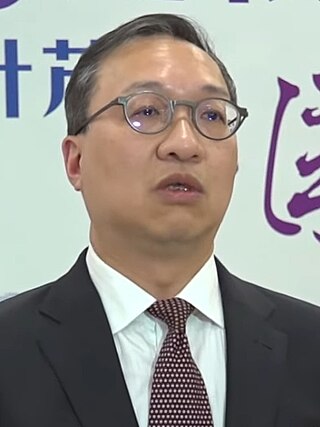
Hong Kong is a special administrative region of the People's Republic of China. With 7.4 million residents of various nationalities in a 1,104-square-kilometre (426 sq mi) territory,Hong Kong is one of the most densely populated territories in the world.
Article 23 is an article of the Hong Kong Basic Law. It states that Hong Kong "shall enact laws on its own to prohibit any act of treason,secession,sedition,subversion against the Central People's Government,or theft of state secrets,to prohibit foreign political organizations or bodies from conducting political activities in the Region,and to prohibit political organizations or bodies of the Region from establishing ties with foreign political organizations or bodies."

The Hong Kong Polytechnic University (PolyU) is a public research university in Hung Hom,Kowloon,Hong Kong. The university is one of the eight government-funded degree-granting tertiary institutions in Hong Kong. Founded in 1937 as the first Government Trade School,it is the first institution to provide technical education in Hong Kong. In 1994,the Legislative Council of Hong Kong passed a bill which granted the former Hong Kong Polytechnic official university status.

The Kowloon-Canton Railway Corporation is a Hong Kong wholly government-owned railway and land asset manager. It was established in 1982 under the Kowloon-Canton Railway Corporation Ordinance for the purposes of operating the Kowloon–Canton Railway (KCR),and to construct and operate other new railways. On 2 December 2007,the MTR Corporation Limited (MTRCL),another railway operator in Hong Kong,took over the operations of the KCR network under a 50-year service concession agreement,which can be extended. Under the service concession,KCRC retains ownership of the KCR network with the MTRCL making annual payments to KCRC for the right to operate the network. The KCRC's activities are governed by the KCRC Ordinance as amended in 2007 by the Rail Merger Ordinance to enable the service concession agreement to be entered into with the MTR Corporation Limited.

The Chief Secretary for Administration,commonly known as the Chief Secretary of Hong Kong,is the most senior principal official of the Government of the Hong Kong Special Administrative Region. The Chief Secretary is head of the Government Secretariat which oversees the administration of the Region to which all other ministers belong,and is accountable for his or her policies and actions to the Chief Executive and to the Legislative Council. Under Article 53 of the Basic Law,the position is known as "Administrative Secretary". As the second highest ranking public official in Hong Kong,the Chief Secretary acts as Acting Chief Executive when the Chief Executive is absent.
This article gives detailed information on the employment situation in Hong Kong.

The District Court is the intermediate court system in Hong Kong,having limited criminal and civil jurisdictions. The District Court was established in 1953 with the enactment of the District Court Ordinance. It is located in the Wanchai Law Courts,Wanchai Tower,12 Harbour Road. In the past there were six district courts,namely Victoria,Kowloon,Fanling,Tsuen Wan,Tuen Mun and Sha Tin,before being amalgamated and moved to the same location in March 1991.

The Food and Environmental Hygiene Department (FEHD) is a department of the Hong Kong Government,reporting to the Environment and Ecology Bureau. It is responsible for food hygiene and environmental hygiene. It replaced part of the role of the Urban Council and the Urban Services Department,and the Regional Council and the Regional Services Department.

The Hong Kong Science and Technology Parks Corporation (HKSTP) is a public corporation set up by the Hong Kong Government in 2001 to foster innovation and technology development in Hong Kong.
Under Article 108 of the Basic Law of Hong Kong,the taxation system in Hong Kong is independent of,and different from,the taxation system in mainland China. In addition,under Article 106 of the Hong Kong Basic Law,Hong Kong has independent public finance,and no tax revenue is handed over to the Central Government in China. The taxation system in Hong Kong is generally considered to be one of the simplest,most transparent and straightforward systems in the world. Taxes are collected through the Inland Revenue Department (IRD).

The Antiquities Advisory Board (AAB) is a statutory body of the Hong Kong Special Administrative Region with the responsibility of advising the Antiquities Authority on any matters relating to antiquities and monuments. The AAB was established in 1976 along with the Antiquities and Monuments Office (AMO) when the Antiquities and Monuments Ordinance (Cap. 53) was enacted,and comprises members appointed by the Chief Executive. The corresponding governmental ministry is the Development Bureau,and executive support for the AAB is provided by the AMO which is under the Development Bureau.

The Constitutional and Mainland Affairs Bureau is a ministerial-level policy bureaux of the Government of Hong Kong responsible for the implementation of the Basic Law,including electoral matters and promotion of equal opportunities and privacy protection. The bureau also functions as the intermediary between the HKSAR Government and the Central People's Government and other Mainland authorities under the principles of "One Country,Two Systems",including the coordination of liaison between the HKSAR Government and Central authorities,promoting regional co-operation initiatives between Hong Kong and the Mainland,and overseeing the operation of offices of the HKSAR Government on the Mainland.

The Minimum Wage OrdinanceCap. 608 is an ordinance enacted by the Legislative Council of Hong Kong to introduce a minimum wage in Hong Kong in July 2010. The executive branch proposed a minimum wage of HK$28 (~US$3.61) per hour in November 2010,which the Legislative Council voted to accept after much debate in January 2011. It came into effect on 1 May 2011. Prior to this,there had also been a fixed minimum wage for one specific class of workers,foreign domestic helpers,of HK$3,740/month. The Hong Kong statutory minimum wage for non-domestic workers is HK$37.5 (~US$4.83) per hour,effective 1 May 2019.
The Consumer Council is an independent statutory authority in Hong Kong,established in 1974 and formalised in April 1977 under the Consumer Council Ordinance. Its role is to enhance consumer welfare and empower consumers to protect themselves. As shown below,over the course of the past four decades,the expansion in the council's duties and services on consumer protection,such as the publishing of the CHOICE Magazine in 1976,the recent launch of online price-watching tools,and conducting studies on different aspects of the consumer market,have coincided with the socio-economic development of Hong Kong. Apart from being a consumer advisor,it has assumed the role as a key stakeholder in making of consumer-related policies.

Hong Kong Children's Hospital is the first children hospital in Hong Kong's public healthcare system,located in Kowloon City,Hong Kong. Located at the south apron of the former Kai Tak Airport,the hospital has 468 beds for inpatients and day-patients,providing mainly tertiary services for complex and rare paediatric cases. Funded by the Hong Kong Government,construction of the HK$13 billion hospital began in August 2013. The hospital treats patients with a referral up to 19 years of age.

The Emergency Regulations Ordinance is a law of Hong Kong that confers on the Chief Executive in Council the power to make regulations on occasions that the Chief Executive believes to be an emergency or public danger. It was first introduced in Colonial Hong Kong in 1922 to combat the seamen's strikes which had immobilised the city's ports,and was invoked on several occasions during the colonial rule.

Immigration to Hong Kong is the process by which people migrate to the Chinese special administrative region of Hong Kong for the purpose of residing there. The region has its own Hong Kong immigration policy governing how such migration may be carried,including for those immigrating from mainland China.

The Competition Commission is the independent statutory body charged with regulating competition in Hong Kong. It was established under the Competition Ordinance,enacted in June 2012,which aims to prohibit conduct that prevents,restricts or distorts competition,and to prohibit mergers that substantially lessen competition in Hong Kong.

Paul Lam Ting-kwok is a Hong Kong Senior Counsel who is the current Secretary for Justice.
Events in the year 2023 in Hong Kong.












